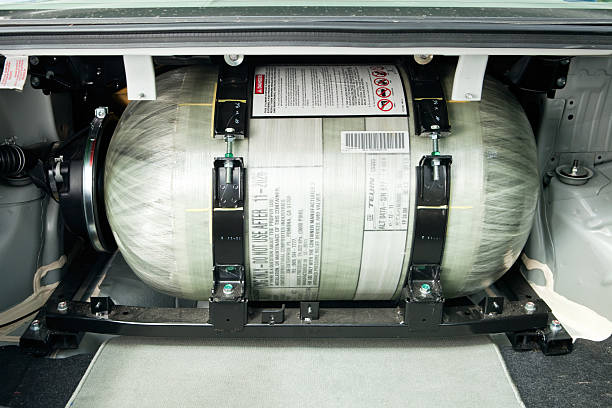"More than 100,000 vehicles have been adapted to run on CNG or with the hybrid option of CNG and petrol, and at least $175 million has been invested by the government under the initiative.” - Michael Oluwagbemi, Presidential CNG Initiative.
With rising petrol prices in Nigeria, many car owners are looking for alternative fuel options to reduce costs and keep their vehicles running efficiently. Which is why the Nigerian government is pushing for a transition to Compressed Natural Gas (CNG) as a cleaner and more affordable alternative to petrol and diesel.
This blog post provides a detailed guide on what Nigerian car owners need to know about CNG, including its benefits, vehicle conversion process, safety considerations, availability of refueling stations, and government incentives. If you're wondering whether switching to CNG is the right move for you, you will find your answers in this read.

What is Compressed Natural Gas (CNG) in Nigeria?
Compressed Natural Gas (CNG) is a clean and affordable alternative fuel derived from natural gas (mostly methane) that has been compressed to a high pressure for use as a fuel in vehicles. It burns cleaner than petrol and diesel, producing fewer emissions and reducing environmental pollution. Many countries, including India, Pakistan, and Brazil, have already adopted CNG as a cost-effective and eco-friendly fuel alternative.
When Did CNG Start in Nigeria?
CNG adoption in Nigeria started in the early 2000s with pilot programs led by the Nigerian government and private sector initiatives. Wikipedia files that it started with a pilot project in Benin city, Edo state in 2010 by NIPCO Gas Limited. However, it gained more traction in 2020 when the National Gas Expansion Programme (NGEP) was introduced to promote natural gas as an alternative to petrol and diesel. Today, efforts are being intensified to expand CNG infrastructure and encourage widespread usage.
What is the CNG Opportunity in Nigeria?
The CNG opportunity in Nigeria lies in its potential to reduce fuel costs, lower emissions, and enhance energy security. With Nigeria having one of the largest natural gas reserves in Africa, transitioning to CNG can decrease reliance on imported petroleum products and create new jobs in the energy sector. The government is also investing in infrastructure to make CNG more accessible nationwide.
Benefits of CNG for Nigerian Car Owners
Switching to CNG-powered vehicles comes with several advantages:
1. Cost Savings
One of the biggest reasons car owners are considering CNG is the cost advantage over petrol and diesel.
In Nigeria, CNG is significantly cheaper than petrol, which means you can save money on fuel expenses in the long run
2. Environmentally Friendly
CNG cars produce fewer emissions compared to petrol or diesel vehicles.
It helps reduce carbon monoxide, nitrogen oxides, and particulate matter in the air, improving overall air quality
3. Better Engine Performance and Durability
CNG burns cleaner than petrol, reducing engine deposits and extending the lifespan of your vehicle’s engine.
It provides smoother combustion, reducing vibrations and wear-and-tear on critical engine components
4. Reduced Dependency on Petrol and Diesel
With Nigeria’s fuel subsidy removal and frequent petrol price hikes, CNG provides a more stable and affordable fuel source.
This shift can help reduce reliance on imported petroleum products, strengthening Nigeria’s energy security
How to Convert Your Car to CNG in Nigeria
If you’re considering making the switch, here’s what you need to know about the CNG conversion process:
1. Vehicle Assessment
Not all vehicles are compatible with CNG conversion. A professional technician will check if your car’s engine type and fuel system can support CNG.
Older cars with carburetor engines may require modifications to work efficiently with CNG.
2. CNG Kit Installation
A CNG kit consists of components such as a high-pressure cylinder, fuel injector, pressure regulator, and a switch that allows you to alternate between petrol and CNG.
Only certified conversion centers should install these kits to ensure safety and compliance with government regulations.
3. Inspection and Testing
After installation, the vehicle undergoes pressure and leak testing to ensure the system is functioning correctly.
A test drive is carried out to confirm engine performance and fuel efficiency.
4. Registration and Certification
Once converted, your vehicle needs official certification from regulatory bodies like the Nigerian Midstream and Downstream Petroleum Regulatory Authority (NMDPRA).
Certified CNG vehicles get a special permit for refueling at approved CNG stations.
Safety Considerations for CNG Vehicles
1. CNG is Safer than Petrol and Diesel
CNG is lighter than air, so in case of a leak, it disperses quickly instead of accumulating and causing fire hazards.
Unlike petrol, CNG has a higher ignition temperature, reducing the risk of accidental fires.
2. Proper Installation Matters
3. Regular Maintenance is Essential
CNG components, such as cylinders and pressure regulators, need periodic inspections.
Always check for leaks, damaged pipes, or pressure loss in your system.
Availability of CNG Refueling Stations in Nigeria
One of the major concerns for car owners is where to refuel their CNG-powered vehicles. Currently, CNG stations are limited, but the Nigerian government is working on expanding the network.
Current Infrastructure
Most CNG refueling stations in Nigeria are located in cities like Lagos, Abuja, and Port Harcourt.
New stations are being set up under the government’s National Gas Expansion Programme (NGEP).
Future Developments
Government Incentives for CNG Users
To encourage more Nigerians to switch to CNG, the government has introduced various incentives:
1. Subsidized Conversion Costs
2. Reduced Import Tariffs on CNG Kits
3. CNG Adoption in Public Transport
Conclusion
With soaring fuel prices and the need for eco-friendly alternatives, CNG is emerging as a practical and cost-effective solution for Nigerian car owners.
By making the switch, you can save money, reduce emissions, and contribute to Nigeria’s energy security. If you're considering CNG, ensure you consult a certified conversion expert and stay updated on the expansion of refueling stations.